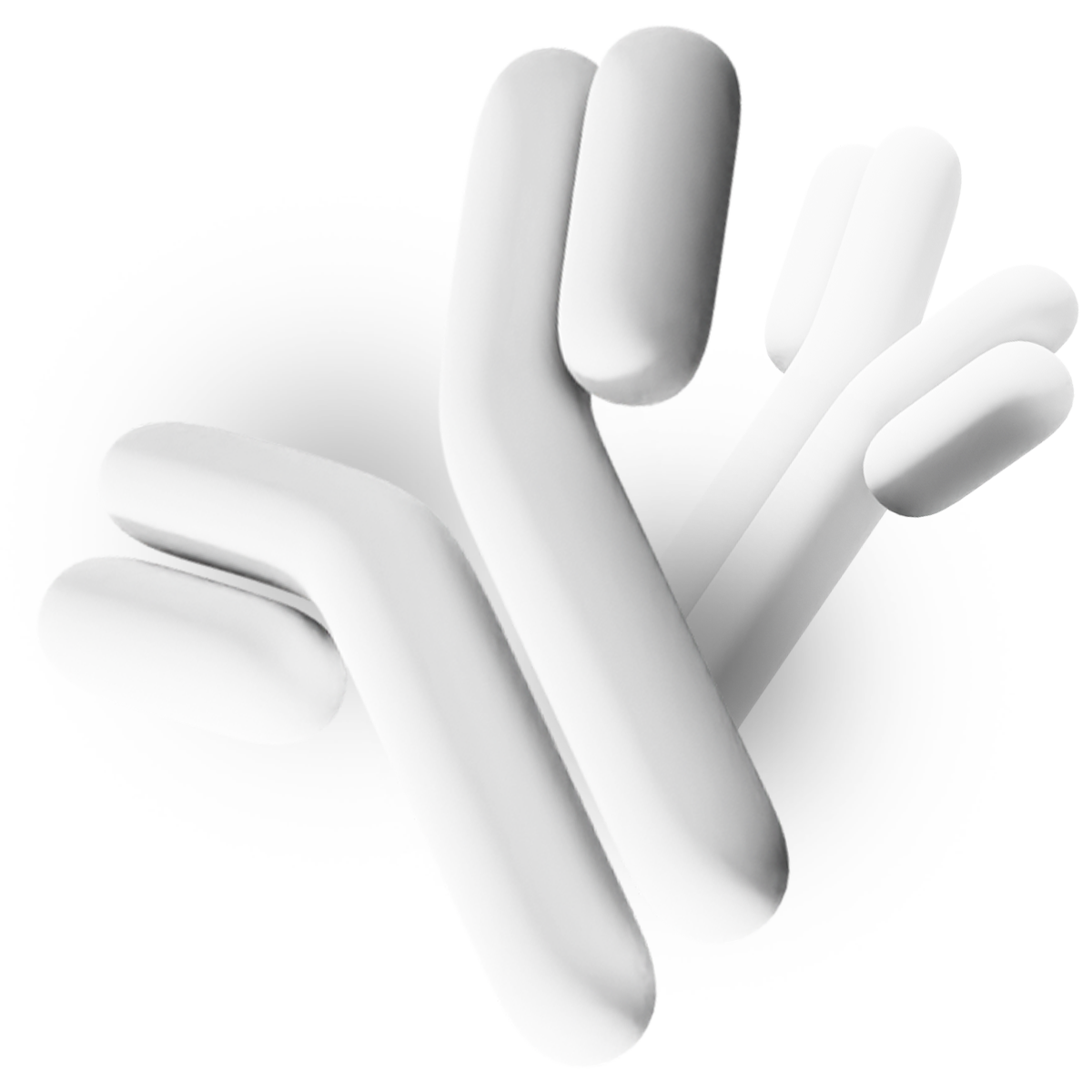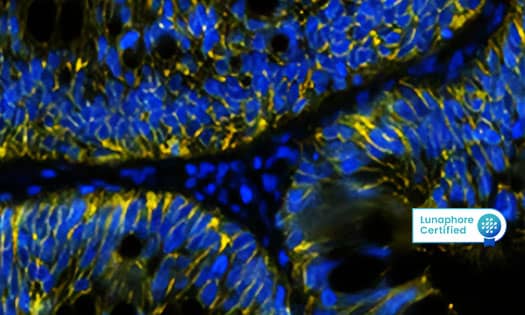
Since adding Novus Biologicals™, part of Bio-Techne, to our online catalog we have over 400,000 antibody products to view and purchase.
Featured Antibody Capabilities
Antibodies for Immune Cell Therapy
Antibodies for Immune Cell Therapy
Find highly specific monoclonal and recombinant monoclonal antibodies for activation, expansion, and characterization of T cell and NK cell therapies.
Multiplex IF Antibodies for Spatial Biology
Multiplex IF Antibodies for Spatial Biology
Antibodies for Multiplex Immunofluorescence (mIF) undergo rigorous testing for specificity, sensitivity, and biological robustness specifically on the COMET™ platform from Lunaphore, a Bio-Techne brand.
Antibodies by Applications
Immunohistochemistry (IHC) Handbook
Immunohistochemistry (IHC) is a widely used immunostaining technique using antibodies to detect an antigen of interest in the cells of a fixed tissue section and provides semi-quantitative data about target protein expression, distribution, and localization.
Our recently updated handbook offers a comprehensive introduction to IHC that is well-suited for researchers new to the technique and experienced scientists looking for a quick refresher.
Antibodies are large glycoproteins produced by the immune system to help defend the host against foreign invaders. They are Y-shaped molecules that are composed of two identical heavy and light polypeptide chains. One heavy and light chain associate via their N-terminals, forming a domain that will bind to its antigen. An antigen is a substance that initiates an immune response. It is typically a protein, but may also be a carbohydrate, small molecule or nucleotide. Each antibody will only recognize and bind to one specific epitope (i.e. site) on an antigen. This specific binding allows antibodies to be powerful research tools for the detection of a specific protein in an assay.
Learn more in our Antibody Basics.
What is the difference between monoclonal and polyclonal antibodies?
Monoclonal antibodies are a homogenous population of antibodies that are produced by a single clone of plasma B cells. These antibodies recognize and bind to one epitope on the antigen. Polyclonal antibodies are a heterogeneous mixture of antibodies that is produced by a population of clones of plasma B cells. The antibodies recognize the same antigen but bind to different epitopes on the antigen.
What are recombinant monoclonal antibodies?
Recombinant antibodies are monoclonal antibodies that are produced by molecular cloning techniques instead of hybridoma-based technologies. In other words, recombinant antibodies can be produced animal-free; genes for specific light chains and heavy chains are inserted into expression vectors, which are introduced into host cells. The host cells produce the antibodies, which can then be collected. Advantages of recombinant monoclonal antibodies include improved lot-to-lot consistency and reproducibility, ability to scale up to gram quantities, and opportunity for high-throughput, animal-free production.
How do you test for antibody specificity?
Bio-Techne has adopted the recommendations outlined by the International Working Group for Antibody Validation, which was published in 2016 in Nature Methods (Uhlen, M. et al. (2016) Nat. Methods 13:823), for antibody validation. The methods we utilize include knockout validation via gene editing and knockout cell lines, and orthogonal validation using RNAscope® in situ hybridization technology. Visit our Antibodies Built for Reproducibility page to learn more.
How do you test for antibody reproducibility?
Bio-Techne takes rigorous steps toward providing antibodies that display the same high specificity from lot-to-lot. We develop and manufacture over 90% of our products in house, giving us control over product development and testing. The immunogens we use to produce our antibodies are designed to ensure correct epitope presentation using our high-quality proteins, transfected cells, or carefully selected peptide sequences. The new antibody lots are then screened beside previous commercial lots to ensure the new lots exhibit the same sensitivity and specificity. Visit our Antibodies Built for Reproducibility page to learn more.
What are secondary antibodies?
A secondary antibody is an antibody directed against another immunoglobulin (antibody) molecule. They are used to aid in the detection, sorting or purification of target antigens. Visit our Secondary Antibodies FAQs page to learn more.
What is an isotype control?
All immunoglobulins will bind non-specifically to cells expressing Fc receptors on their surface. Antibodies raised in mice, particularly of the IgG2a isotype, bind strongly to some human leukocytes. Isotype or negative controls are incorporated into flow cytometry (or occasionally IHC) protocols to assess the level of non-specific binding to Fc receptors on the target cell.
Does your company make custom antibodies?
Yes, our expert scientists will work with you to deliver the antibody that meets all your required specifications. In tandem, an assigned project manager will ensure clear and constant communication throughout. We generate antibodies under controlled conditions with rigorous quality control testing to ensure high specificity and outstanding performance in the desired application(s).
Learn more about our Custom Antibody Services.
Could you please provide information on how to find positive controls for your primary antibodies?
The images on our datasheets will provide detailed information on potential positive controls cells and/or tissues, which have been previously tested by the lab for antibody validation. We also provide a Related Products table at the top of the datasheet, which will contain useful control information where available. In addition to these tools, we recommend checking tools such as Uniprot or Protein Atlas to determine tissues and cell lines that highly express your protein of interest.
What is the difference between cross adsorbed/normal/purified antibodies?
Pre-adsorption (also referred to as cross-adsorption) is an extra step to increase the specificity of an antibody. Antibodies (for example, antibodies recognizing rabbit IgG light-chains) are passed through a matrix containing immobilized serum proteins from potentially cross-reactive species (for example, antibodies that recognize sheep and bovine light-chains). Only antibodies specific to rabbit IgG-light chains will pass through the column. Antibodies cross-reacting with sheep or bovine IgG light-chains will bind and stay adsorbed to the matrix. The result of the procedure is a more specific antibody, which is especially useful in IHC when cross-reactivity is feared. Purified antibodies have been purified by binding to protein A or protein G or by binding to the immunogen used to generate the antibody.
Why has this antibody been discontinued and is there a way to obtain the discontinued stock?
Occasionally, it becomes necessary to discontinue a product from our catalog. Some reasons include a lack of commercial interest, a disruption in supply from an outside collaborator, or unforeseen production difficulties. Rarely, a product will be discontinued for quality issues. We understand that this can be an inconvenience to our customers, and we will do our best to recommend an appropriate alternative, when available. Please contact our technical support team for help in finding any potential replacement products. Once we list an antibody as unavailable on our website, the remaining stock has been exhausted and no additional vials remain.
I am interested in buying one of your antibodies. I am trying to place an order but your company is not on our system. Would you be able to tell me if you have any specific UK suppliers that you use?
We have a European office based in the Abingdon Science park. If you email info@bio-techne.com they will place your order.
Can primary antibodies be reused?
We do not recommend that antibodies are reused.
What is the difference between cross adsorbed/normal/purified antibodies?
Pre-adsorption (also referred to as cross-adsorption) is an extra step to increase the specificity of an antibody. Antibodies (for example, antibodies recognizing rabbit IgG light-chains) are passed through a matrix containing immobilized serum proteins from potentially cross-reactive species (for example, antibodies that recognize sheep and bovine light-chains). Only antibodies specific to rabbit IgG-light chains will pass through the column. Antibodies cross-reacting with sheep or bovine IgG light-chains will bind and stay adsorbed to the matrix. The result of the procedure is a more specific antibody, which is especially useful in IHC when cross-reactivity is feared. Purified antibodies have been purified by binding to protein A or protein G or by binding to the immunogen used to generate the antibody.
Is your guarantee that you will refund the full price of the antibody if it doesn't work as specified still honored with this sample size?
All of our products are backed by our Guarantee for the applications and species listed on the datasheet. Yes, this applies to sample sizes.
Does your company honor this guarantee if the antibody is purchased through a vendor?
All of our products are backed by our Guarantee for the applications and species listed on the datasheet. Yes, this guarantee applies to products purchased through other vendors.
Optimize your experiments to get the best results. We’ve compiled a troubleshooting guide based on potential problems associated with antibodies to help meet your research needs.
Check out our Troubleshooting Guide.








